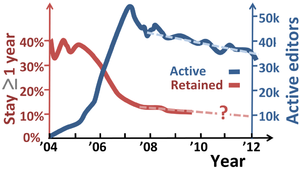Wikipedia/Activity: Difference between revisions
imported>James Yolkowski |
imported>James Yolkowski m (moved What happened to Wikipedia? to Decline in activity on Wikipedia: Better describe article's content) |
Revision as of 19:20, 11 July 2013
From various statistics regarding Wikipedia activity, a marked decrease in the activity on Wikipedia appears to have happened in the 2006–2007 time frame. There is no generally accepted explanation for this decrease, although many theories have been proposed by "Wikipedians" and the Wikimedia Foundation (WMF). Coincidentally, some management changes occurred in this time frame, and in 2007 Jimmy Wales made Sue Gardner executive director of the WMF.
Decreased activity
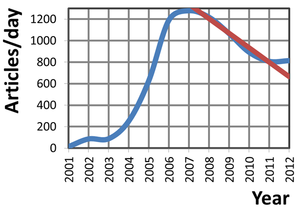
New articles per day on English WP. Average drop is 135 per year (Data from Wikimedia.)
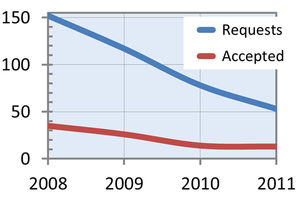
Requests by contributors for formal arbitration by year. (Data from English Wikipedia.)
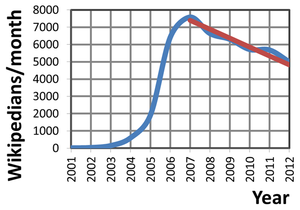
Number of newly registered contributors per month on English WP over its lifetime. Average drop in monthly enrollment is 515 per year (Data from Wikimedia.)
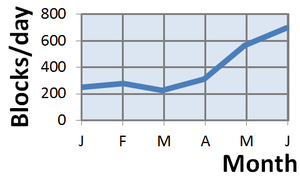
Average number of blocks per day each month in 2012. Data from English Wikipedia.
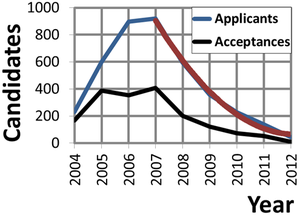
Number of Wikipedians applying for Administrator privileges on English Wikipedia. (Data from English Wikipedia.)
| As the figures to the right indicate, the period of rapid growth for WP is over, with the number of new articles and of new accounts exhibiting a sudden U-turn in rate of growth. The number of applicants for Adminship shows an even more dramatic loss of interest. It is unclear just what happened in 2006-2007 to cause the slowdown in activity. |
| A Wikimedia statistical report has posed this question. See the figure at left and discussion of this figure in Editor trends study/ Results. Wikimedia (May 11, 2011). The term 'editor' on Wikipedia means a person who has changed an article's content, and such change is the prerogative of any reader. |
| In discussing the figure at left, the report suggests there may be a connection between the rapid drop in the percentage of Wikipedians making at least one edit a year after joining (red line), and the rapid upsurge in active editors that occurred in the same 2006-2007 time frame (blue line). One might conjecture this transition indicates a change in climate at WP. The graph shows that many new Wikipedians lost interest in continuing with WP, the fraction maintaining interest dropping from over 40% to only 10%. At the same time the number of editors actively contributing stopped rising and entered a slow decline to a level in 2012 of about two-thirds what it was at its peak in 2007. Discouragement of new contributors, whatever its cause, made it impossible to maintain the growth rate of WP. |
| The bottom figure on the right shows an upsurge in the number of Admin applicants during the 2006-2007 transitional phase. The vast majority of today's Admins were added in 2005-2007: 1,148 of them. |
| The transition of 2006-2007 is accompanied by a persistent drop in the number of formal cases for arbitration, the cases where evidence is formally assessed, which have fallen to about 12 per year. Reliance is now almost entirely upon adjudication by simpler means such as ANI proceedings or blocks by individual Administrators on their own recognizance. The lower figure on the left shows an average of 350 blocks per day, which hugely dwarfs the solitary formal case of 1 per month in the figure above. |
Proposed explanations
Many explanations as to the decline of activity on Wikipedia have been proposed. There is no single authoritative explanation as to why activity on Wikipedia has declined. In all likelihood, the decline is likely a result of the interplay of a large number of factors.
One theory that has been proposed is that the decline is a symptom of Wikipedia's success. As Wikipedia became a household name starting in 2005, all of those wanting to contribute to such a project would likely have joined in that time frame, leaving fewer new editors in subsequent years. As well, as every obvious topic is covered in great depth, fewer people may have an incentive to begin contributing and, as it is only natural for people to leave online communities after around 18 months, the result is a net decline.
Another theory holds that Wikipedia's culture and infrastructure have become more closed and less accepting of new users over time. In order to cope with a major influx of new users beginning in 2004–2005 or so, many policies, procedures, and tools were put in place. These have the side effect of making it difficult for new users to make good faith contributions. There are now automated and semi-automated tools that revert vandalism, but their many false hits often mean that new users making contributions in good faith are quickly made unwelcome and banned. As well, a vast number of pages are now "semi-protected", making it impossible for new users to make good-faith contributions to those pages. Anonymous users are unable to create new pages. Thus, many people may not even begin contributing in the first place.
While the evidence is not as strong for the following hypothesis, it has also been suggested that long-term editors are being driven off by excessive conflict and friction, caused by administrators and editors who regularly act in an unfriendly, contentious way.
Finally, it may just be that there are many more things to do on the Internet now than there were in 2005, and people only have so many hours in the day. If people are, say, spending more time on Facebook, they may not be able to spend as much time on Wikipedia.
Further reading
- Editor Trends Study/Results. Editor trends study. Wikimedia Strategic Planning (14 May, 2011).
- See Sue Gardner: Executive director, Wikimedia Foundation. Wikimedia Foundation. Sue Gardner has announced plans for leaving and has appointed a transition team.
- An Evaluation of Wikipedia’s Statistical Health Indicators
- The Rise and Decline of an Open Collaboration Community: How Wikipedia's reaction to sudden popularity is causing its decline
- Task force/Community Health/Questions and answers
- Log analysis
